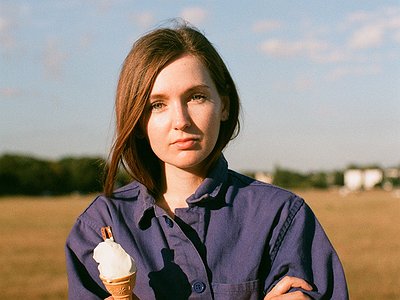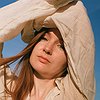Part 1
Name: Maz O’Connor
Nationality: British
Occupation: Singer, songwriter
Current Release: Maz O’Connor's new album What I Wanted is out via Restless Head.
Recommendations: My recommendation is the novels of Jean Rhys. I recently re-read Wide Sargasso Sea and was blown away for a second time. She's one of my favourite writers; her prose is so simple yet bursting with life. Her earlier novel Voyage in the Dark is about a young showgirl living in London and struggling to find her way. It's a world of music and theatre and parties and terrible London flatshares. It's an amazing read with surprisingly contemporary resonances.
If you enjoyed this interview with Maz O’Connor and would like to know more, visit her official website. She is also on Instagram, Facebook, twitter, and Soundcloud.
When did you start writing/producing/playing music and what or who were your early passions and influences? What was it about music and/or sound that drew you to it?
Music was a big part of my childhood; my mum was a music teacher and my brother and I both learned piano early. Through my dad’s Irish heritage we were pretty into Celtic stuff, too, and I knew several traditional folk songs that I would sing at parties and ceilidhs. I never got on with music exams, though– sight reading and all of that stuff. So I kind of turned away from music for a while and got more into drama and dance.
Then, when I was 15, I bought an early Bob Dylan record from the second-hand vinyl shop in town (Barrow-in-Furness, where I grew up). That’s when I started playing guitar, learning mostly from youtube. From there I got into Joni Mitchell, Joan Baez, Chuck Berry, The Beach Boys; whatever I could find in the vinyl shop. Guitar-playing singer-songwriters seemed to bring together my interests in literature and folk music, and by the time I was at uni studying English, I was well into all the 1960s and 70s icons.
What drew me and continues to draw me into music and sound is the way it reaches directly into my heart and soul and takes me to a deeper, more instinctive place.
When I listen to music, I see shapes, objects and colours. What happens in your body when you're listening and how does it influence your approach to creativity?
I think I see scenes. Stories, characters, landscapes. Almost like I’m watching a film.
Often I flip this around: I use films and TV shows to inspire my writing. Not literally, it’s more about accessing intense feelings. Sometimes I’ll even turn the sound down and write over the top of scenes. It helps me get out of my literal headspace and into something deeper and more emotional.
How would you describe your development as an artist in terms of interests and challenges, searching for a personal voice, as well as breakthroughs?
This could be a very long answer so I’ll try to keep it short! As a child I loved singing, dancing and acting, though I was very shy and certainly not a show-off. I just loved stories, and the feeling of expressing my emotions.
I realised I was a good singer when I was visiting a folk festival aged 13, and I entered a youth music competition just because my brother was also entering. I ended up winning and the prize was to perform in front of an audience of 500 people. I sang a traditional folk song called ‘The Blacksmith’.
From there I spent a few years singing traditional folk songs at traditional folk festivals, and I think what I enjoyed about these songs was the drama: they’re essentially dramatic monologues which require the singer to create and perform a character. However, at the same time I was listening to quirky anti-folk songwriters like Regina Spektor and Joanna Newsom. I was obsessed with Bob Dylan and Joni Mitchell and Nina Simone.
At university, I sang my own songs at open mic nights. When I left uni, these two influences (trad songs and original songs) were in conflict in my head and heart. I’ve always felt pulled between the two, and my main challenge has been to try and marry the two in a way that feels authentically me.
I’ve also been pulled in lots of different directions by ‘industry’ people whose opinions are based on commercial and not necessarily artistic principles. Honestly I’ve had quite a confusing time! But now I realise that’s just being in your twenties. What’s useful about being a singer-songwriter is that the normal identity confusions of growing up as an adult are reflected and worked out by the artistic process at the same time. I’m grateful for that.
The breakthrough for me came through diversifying my work. I was putting a lot of pressure on my little songs to do everything: tell stories, have hooks, have original melodies, be radio-friendly, appeal to my folkie fans AND express my soul. That’s a lot! Songs are only 3 minutes long and they can’t hold very much. I was trying to balance an elephant on a pinhead.
Now I’ve learned to ease off the pressure on those little songs. I’m writing a musical, I’m writing a book, and I have collaborative side-projects, all of which free up the songs to be simple and clear. I honestly think my songwriting is getting better and better, which is super exciting.
And about marrying the two influences in a way that feels authentically ‘me’—I think that’s happened naturally over time. I wish I’d worried less, but it’s easy to say that now, looking back. You have to go through the mud to get to the river, I suppose.
Tell me a bit about your sense of identity and how it influences both your preferences as a listener and your creativity as an artist, please.
My sense of identity is something I’ve wrestled with over the years. I grew up in a working-class town but I always wanted to move to London and be an artist. I was into Greek tragedy and old folk songs and Jane Austen, and so I felt – wrongly – that I should hide these things, so as not to seem pretentious. The lyrics of The Smiths spoke to me very strongly, but I also loved ballet.
Then I went to Cambridge and felt like an alien all over again. I didn’t know any gallery apart from The National Gallery, and my clothes weren’t good enough, and my accent was something the Footlights’ comedians often gave to the ‘stupid’ characters in their shows. I felt I was neither one thing nor the other. Not working-class enough; not posh enough.
Then there’s the question of heritage: my father was born to Irish immigrants in Liverpool and has always identified very strongly as Irish. I spent a lot of time in Ireland as a kid, and connected strongly with the culture, the landscape and the music. But I’m English, I suppose. So I’ve also felt not Irish enough and not English enough at times. Neither-nor again.
But I’ve learned, through my artistic practice, not to feel ashamed of these tensions. In fact, these in-between places are fascinating. If I meet them with curiosity rather than shame, they can generate a lot of material for me. Besides, these days, most of us are mongrels. It’s only music marketing that requires you to describe yourself in one sentence, as though that’s easy for any of us.
What, would you say, are the key ideas behind your approach to music and art?
It depends on the form: songs, musical or novel. But for songs, my current principle is to keep things as simple as possible. In the past I’ve been hung up on ‘sound’ and ‘production’ but these things are the wrapping, not the gift itself. Besides, they’re subject to trends and fashion and so I’ve decided, now, not to pay them too much attention, at least not in the writing stage.
I usually begin with a guitar, and find a chord progression that brings me comfort. Words come from a sub-conscious place, and I aim for truth without always knowing where I’m going. I try to catch myself when I’m ‘trying’ to come across a certain way, and push myself to only tell the truth, no matter how ‘uncool’ it is. It takes a great deal of faith to let the music unfold itself and not criticise it at this point. I’ll edit later to make sure the craft of the song is strong enough that an audience is invited into its world.
It’s deeply important to me to make songs that connect with others, that might express something in which others can feel relief. But I’ve learned that this isn’t something an artist can anticipate. The best way, I think, is to make something that I like, something that honest to me. There’s so much shite in everyday life – patriarchy, capitalism, individualism, mental ill health, war, destruction of the natural world – and my aim in my work is to cut through it, to expose deeper, perennial truths underneath.
The chances are, if I manage to make something true, that it will resonate with others.
How would you describe your views on topics like originality and innovation versus perfection and timelessness in music?
I’ve often considered this, and I’m of the view that we’re standing on the shoulders of those that come before us. Together, all artists are contributing to music as a whole. As though we’re each a tree and together we make a beautiful forest.
I think originality is a dangerous myth, not only because it puts pressure on artists to achieve the impossible, but also because it perpetuates the idea of the individual genius, which I think is a patriarchal construct compounded by our current culture of life-as-achievement.
Whatever we make as artists will be a little bit like everything else, sometimes a lot like a few other things, and hopefully a little bit different to everything else. And that’s cool.
Over the course of your development, what have been your most important instruments and tools - and what are the most promising strategies for working with them?
My voice, I suppose, would have to be my most important instrument. It was with me before I even touched a piano or a guitar.
One of my earliest memories is locking myself in the bathroom and singing “Ariel’s song” from ‘The Little Mermaid’ as loudly as I could. It’s my first and truest way of expressing myself, because it’s a part of my physical being. I write with and for my own voice, and really enjoy the feeling of it. It informs my melodies, my rhythm, my lyrics.
I’ve had trouble with it, though. When my last album, Chosen Daughter, came out, I felt that there’d been so much focus on my ‘voice’ rather than my singing or my writing, and that put a pressure on something that didn’t feel under my control.
A bit like praising an athlete for their leg, as though all of the athlete’s talent, and career, is held inside it. It wouldn’t be surprising if the athlete started to get anxious about the leg. Is it twitching? Is it tired? Is it going to collapse underneath me? That’s how I felt about my voice, and I had some pretty scary experiences singing live on radio, thinking that my voice was going to suddenly disappear (like Ariel’s).
In the end I had to get some therapy, thanks to Help Musicians, and I realised I was holding a lot of tension around the whole concept of my ‘voice’. I have a much kinder, more appreciative relationship with singing now. My ‘voice’ isn’t a separate entity anymore; it’s me.






